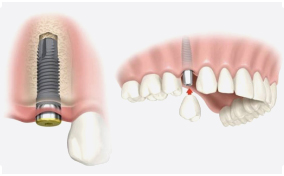Your dentist in Ajax utters those words nobody wants to hear, that you need a tooth removed and there is no hope of saving it. Most people find this upsetting or even devastating, but now you need to think about how to replace it and the sooner, the better. The two most common solutions are a tooth-supported bridge or a dental implant with an implant-supported crown. One factor that is important to most people is the cost.
Comparing the Costs
A tooth-supported bridge can last ten years or more and will cover three teeth (the tooth that is missing plus the two teeth supporting the bridge). A dental implant initially costs more but can last considerably longer. Also, when you need to replace these restorations, you will only need to budget for a single implant crown, rather than a three-tooth bridge. When you break down the costs over two or more decades, a dental implant in Whitby can look like a very reasonable option! Then, of course, there is the appearance of these restorations to consider.
Comparing the Appearance of a Dental Implant with a Tooth-Supported Bridge
A tooth-supported bridge can look extremely good and especially if you choose one made entirely from ceramics. It will be designed to look as lifelike as possible, and the replacement tooth will rest snugly on your gum. However, your gum and the bone underneath it can change shape over time, potentially affecting the overall appearance of the bridge. A dental implant crown will provide the most natural outcome because it will appear to be emerging from your gum, just like your other teeth and it would be extremely difficult for anyone to tell it wasn’t your own.
Comparing Oral Hygiene Routines
Looking after your dental restorations is crucial if you want them to last for as long as possible. A single dental implant is super easy to care for as you can brush and floss it just like a natural tooth. A dental bridge in Pickering will need a bit more care as you must clean thoroughly around and under the replacement tooth, called a pontic and which rests on the gums.
Comparing the Impact of Each Treatment on Your Oral Health
Dental implants are self-supporting and can have a positive impact on your natural teeth. This is because the implant tooth will share the stresses of biting and chewing food and will help to prevent your natural teeth from drifting out of place, keeping them strong and stable. A fixed bridge will impact your natural teeth quite significantly because the abutment teeth which are used to support the bridge must be substantially reshaped. This is because they will be covered up with dental crowns that support the pontic and unless enough tooth structure is removed, these crowns would look and feel too bulky. Covering up the teeth adjacent to the gap isn’t always a bad thing, and especially if these teeth have large fillings or are damaged in some way and could benefit from being crowned. If this isn’t the case, it could mean cutting down perfectly healthy teeth which you might want to avoid.
Another critical factor is the effect of tooth loss on your jawbone. Dental implants are the only treatment that will help to preserve and protect this bone. After natural teeth are removed, some jawbone is resorbed, and much of this bone loss occurs in the first year or so after tooth loss. If you are considering dental implants, it is better to have them sooner rather than later, and you can enjoy the outcome of treatment that much sooner.
There are a lot of different factors to consider when thinking about how to replace a tooth, and our implant dentist here at Durham Dental Solutions can discuss each option with you.


